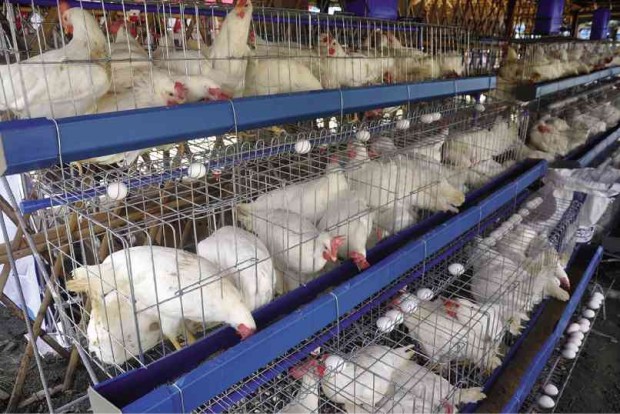DA seeks poultry raisers’ help vs bird pest

THE DEPARTMENT of Agriculture wants tighter monitoring of poultry raisers and game fowl breeders to stop the spread of the Newcastle Disease Virus. WILLIE LOMIBAO/INQUIRER NORTHERN LUZON
The Department of Agriculture (DA) has allayed fears that the Newcastle Disease Virus (NDV), which has killed 41,000 game fowls and range chickens in northern and central Luzon since last month, would disrupt the regions’ poultry supply of up to 20 million broilers.
But government veterinarians in Tarlac and Pangasinan provinces and in the Southern Tagalog provinces of Laguna and Quezon have urged poultry raisers to adopt tighter measures to prevent the spread of NDV, a highly contagious and often severe disease that has struck poultry farms in several Luzon provinces. Pangasinan poultry raisers were the first to raise the alarm last week.
In Tarlac, Dr. Maria Lorna Baculanta, the provincial veterinarian, confirmed that the disease killed at least 12,000 backyard chickens and fighting cocks in 17 towns and this city. She said NDV last hit the province in 2000.
NDV, also called avian pest, has a high mortality rate and can wipe out a poultry farm in 24 hours. Humans exposed to an infected fowl can suffer mild conjunctivitis and influenza-like symptoms. But the disease does not pose a serious health hazard.
Migratory birds
Most cases in Central Luzon, the biggest supplier of poultry products in Metro Manila with 19 to 20 million broilers, occurred in the provinces of Pampanga, Tarlac and Nueva Ecija.
Dr. Eduardo Lapuz, chief of the regulatory division of DA Central Luzon, said the virus spread after Typhoons “Lando” and “Nona” blew through Luzon in December.
“We are also looking at migratory birds as the carriers of NDV,” he said.
The Tarlac Game Fowl Breeders Association reported losing 618 fighting cocks and several hundreds of ducks and pigeons to the disease.
Baculanta said there could be unreported cases because some towns had not submitted their reports yet to her office. But she said commercial poultry raisers had their own vaccination programs that had shielded their poultry from the disease.
To prevent the spread of NDV, the Bureau of Animal Industry said, poultry farm owners can introduce these measures: spraying the poultry with disinfectant after a thorough cleaning, leaving the cages empty for at least two weeks before restocking, and washing and disinfecting all fowl hauling equipment and vehicles.
The DA is distributing vaccines and disinfectants to backyard poultry farmers to help contain the virus. The agency is also asking poultry owners to spray their farms with disinfectant because NDV is transmittable by air.
Dr. Eric Perez, Pangasinan provincial veterinarian, said livestock inspectors were now overseeing the province’s eight animal quarantine checkpoints against chickens being transported to the province.
He said NDV cases had been reported in the towns of Calasiao, Villasis, Laoac, Sta. Barbara, Mabini and Binalonan and in the cities of Urdaneta and Dagupan.
Strict monitoring
In Southern Luzon, government veterinarians have stepped up the monitoring of game fowls and backyard poultry raisers after the Regional Animal Disease Diagnostic Laboratory (RADDL) of the DA confirmed an NDV case in Batangas province.
Dr. Gloria Salazar of the RADDL said 12 peacocks were taken to her office for testing last month after the animals showed symptoms of NDV. One of these birds died, she said.
Salazar said provincial veterinarians had begun monitoring areas in Quezon and Laguna provinces where incidents of NDV had been reported.
In Laguna, Dr. Grace Bustamante, provincial veterinarian, said they started monitoring backyard raisers in San Pablo City and in the towns of Calauan and Sta. Cruz.
The Laguna government, reports said, will distribute water-soluble antibiotics to backyard raisers, since most commercial poultry farms are believed to have complete vaccinations for their stock and implement stricter biosecurity measures.
In Quezon, the provincial veterinarian urged poultry owners, including cockfighting aficionados and game fowl breeders, to join efforts in stopping the spread of NDV.
Game fowls
In a memorandum on Jan. 28, Flomella Caguicla, provincial veterinarian, asked municipal veterinarians and agriculturists, livestock inspectors, poultry raisers, fighting cock breeders, and fowl and bird raisers, to observe biosecurity guidelines and measures to prevent the spread of the contagious bird disease.
She urged cockfighting aficionados and breeders to have their game fowls vaccinated to protect them from the disease.
She also asked them to avoid bringing their game fowls to cockpit arenas as a precautionary measure. “Game cocks inside the arena came from different places. We don’t know if there’s an NDV outbreak in their places of origin,” Caguicla said.
She said reports received by her office showed that more than 300 chickens in the village of Maligaya in Dolores, Quezon, had died of NDV.
“This disease is endemic. It is regularly occurring especially during the cold season, so we have to be always ready to control its spread,” Caguicla said. Reports from Gabriel Cardinoza, Inquirer Northern Luzon; Justine Dizon, Inquirer Central Luzon; and Maricar Cinco and Delfin Mallari Jr., Inquirer Southern Luzon














